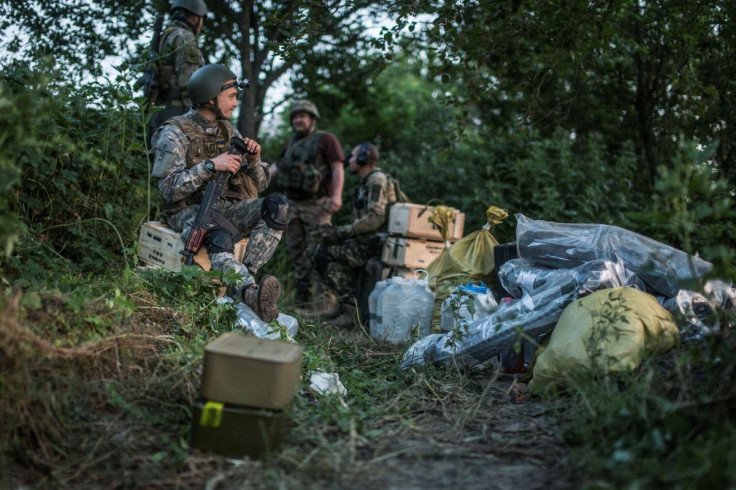Russian Artillery Hits Centre Of Kyiv As World Leaders Gather In Europe

Russia shelled the Ukrainian capital Kyiv on Sunday, a day after a key eastern city fell to pro-Russian forces in a major set-back for Ukraine and as world leaders gathered in Europe to discuss further sanctions against Moscow.
As Europe's biggest land conflict since World War Two entered its fifth month the Western alliance supporting Kyiv was starting to show signs of strain and fatigue.
Indonesia on Sunday called for both sides to negotiate a peace to ensure global food supplies and Britain on Saturday said it believed Ukraine could win, but feared it may be pressured into a "bad" peace deal.
Russian artillery hit Kyiv's central Shevchenkivskiy district on Sunday morning, partially destroying a nine-storey apartment building and causing a fire, the city's mayor Vitali Klitschko said on the Telegram messaging app.
"There are people under the rubble," Klitschko said. He added that several people had already been hospitalised.
"They (the rescuers) have pulled out a seven-year-old girl. She is alive. Now they're trying to rescue her mother."
Life had been returning to normal in Kyiv after fierce resistance held off Russian advances in the early phase of the war, although air raid sirens regularly sound across the city.
There had been no major strikes on Kyiv since June and before that April.
Russia denies targeting civilians, but Ukraine and the West accuse Russian forces of war crimes in a conflict that has killed thousands, sent millions fleeing the Ukraine and destroyed cities.
The key eastern battlefield city of Sievierodonetsk fell to pro-Russian forces on Saturday after Ukrainian troops retreated, saying there was no longer anything to defend in the ruined city after months of fierce fighting.
The fall of Sievierodonetsk is a major defeat for Kyiv as it seeks to keep control of the eastern Donbas region, a key military objective for the Kremlin.
Moscow says the Donbas' Luhansk and Donetsk provinces, where it has backed uprisings since 2014, are independent countries. It demands Ukraine cede the entire territory of the two provinces to separatist administrations.
G7 SUMMIT
Russian President Vladimir Putin invaded Ukraine on Feb. 24, calling it a "special military operation" to ensure Russian security and denazify the Ukraine. Kyiv and the West say the invasion was nothing more than a land grab by Putin.
The war has had a huge impact on the global economy andEuropean security, driving up gas, oil and food prices, pushing the European Union to reduce reliance on Russian energy and prompting Finland and Sweden to seek NATO membership.
Indonesian President Joko Widodo said he will urge his Russian and Ukrainian counterparts to start a dialogue during a peace-building mission to the warring countries and will ask Putin to order an immediate ceasefire.
"War has to be stopped and global food supply chains need to be reactivated," Jokowi, as the president is popularly known, said before leaving to attend a Group of Seven (G7) summit which starts on Sunday in Germany.
The United Nations has warned that a protracted war in Ukraine, one of the world's major grain exporters, threatens to cause a global hunger crisis.
Seeking to further tighten the screws on Russia, U.S. President Joe Biden and other G7 leaders attending the summit will agree on an import ban on new gold from Russia, a source familiar with the matter told Reuters.
Britain is ready to guarantee a further $525 million of World Bank loans to Ukraine later this year, taking total fiscal support this year to $1.5 billion, Prime Minister Boris Johnson said ahead of the G7 meeting.
"Ukraine can win and it will win. But they need our backing to do so. Now is not the time to give up on Ukraine," Johnson said in a statement on Saturday.
NATO leaders will hold a June 29-30 summit in Madrid.
'IT WAS A HORROR'
The fall of Sievierodonetsk - once home to more than 100,000 people but now a wasteland - transforms the battlefield in the east after weeks in which Moscow's huge advantage in firepower had yielded only slow gains.
Russia's Interfax news agency cited a representative of pro-Russian separatist fighters saying Russian and pro-Russian forces had also entered Lysychansk across the river.
The two cities were the last major cities held by Ukrainian forces in the east.
Zelenskiy vowed in a video address on Saturday that Ukraine would win back the cities it lost, including Sievierodonetsk.
"We don't have a sense of how long it will last, how many more blows, losses and efforts will be needed before we see victory is on the horizon," he said.
Oleksiy Arestovych, senior adviser to Zelenskiy, said some Ukrainian special forces were still in Sievierodonetsk directing artillery fire against the Russians. But he made no mention of those forces putting up any direct resistance.
Serhiy Gaidai, governor of the Luhansk region, said Russian forces on Saturday fired at the Azot chemical plant in Sievierodonetsk where hundreds of civilians had been trapped, and also shelled the villages of Pavlograd and Synetsky.
Both Ukraine and Russia have traded accusations of firing at Azot, with Russian-backed separatists in the area saying evacuations were halted due to Ukrainian shelling.
"Air strikes were inflicted on the city, as well as in the area of Bila Gora. There is a lot of destruction - Lysychansk is almost unrecognisable," Gaidai said.
In the Ukrainian-held Donbas town of Pokrovsk, Elena, an elderly woman from Lysychansk in a wheelchair, was among dozens of evacuees who arrived by bus from frontline areas.
"Lysychansk, it was a horror, the last week. Yesterday we could not take it any more," she said. "I already told my husband if I die, please bury me behind the house."
© Copyright Thomson Reuters 2024. All rights reserved.







